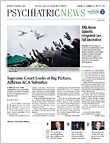For some patients who have undergone rounds of monotherapy for major depressive disorder (MDD), achieving remission may require the use of adjunctive treatment strategies. A study published last month in AJP in Advance shows that the atypical antipsychotic ziprasidone may serve as a potential strategy.
Researchers from the University of Alabama-Birmingham School of Medicine, Massachusetts General Hospital Clinical Trials Network, and the Mayo School of Medicine conducted a multisite study to test the efficacy of adjunctive ziprasidone in patients with MDD.
“Atypical antipsychotics added to prior antidepressant treatment are the most common treatment in the U.S. for treatment-resistant depression,” coauthor Richard Shelton, M.D., the Charles Byron Ireland Professor in the Department of Psychiatry and vice chair for research at the University of Alabama-Birmingham, told Psychiatric News.
“Unfortunately, approved atypical antipsychotics including olanzapine, quetiapine, and aripiprazole are associated with significant weight gain and risk for metabolic diseases such as type II diabetes, cardiovascular disease, and hypertension,” said Shelton. “Of the currently available atypical antipsychotics, ziprasidone is the most ‘weight neutral.’ ”
Another factor that makes ziprasidone a prime candidate as an adjunctive therapy for depression is its partial affinity for serotonin receptor 5-HT1A, which has been associated with relieving depression and anxiety.
To test the effectiveness of ziprasidone as an adjunctive therapy for depression, Shelton and collaborators studied 139 adults who remained symptomatic for nonpsychotic unipolar MDD after receiving 10 mg to 30 mg of the antidepressant escitalopram per day for eight weeks. The patients were divided into two groups: one group received escitalopram plus a 40 mg to 160 mg daily dose of ziprasidone for an additional eight weeks; the other received escitalopram plus placebo. The primary outcome measure was clinical response, defined as a reduction of at least 50 percent in scores on the 17-item Hamilton Depression Rating Scale.
At eight weeks, the analysis showed that symptoms of depression were significantly more likely to have improved from baseline in the escitalopram plus ziprasidone group than the escitalopram plus placebo group. Improvements in symptoms of anxiety were also significantly greater in the escitalopram plus ziprasidone group compared with the escitalopram plus placebo group.
Approximately 14 percent of the patients in the escitalopram plus ziprasidone group discontinued treatment because of intolerance compared with none in the escitalopram plus placebo group. The most common side effects reported included somnolence, fatigue, and akathisia. Rate of weight gain was 1.4 percent in the ziprasidone group and 5.8 percent in the placebo group.
“These results suggest that, similar to other atypical antipsychotic agents, adjunctive ziprasidone can represent a useful treatment option for patients with major depressive disorder,” Shelton and colleagues wrote. However, due to the rates of discontinuance for patients treated with escitalopram plus ziprasidone, the researchers emphasized that more studies testing different dosing regimens are merited.
Shelton’s group is currently exploring the effectiveness of several dosing regimens of ziprasidone and tracking the long-term effectiveness of the drug as an adjunctive therapy for MDD patients.
The current study was funded by the National Institute on Mental Health, Pfizer, and Forest Laboratories. ■
“Ziprasidone Augmentation of Escitalopram for Major Depressive Disorder: Efficacy Results From a Randomized, Double-Blind, Placebo-Controlled Study” can be accessed
here.

